Unicellular organisms Study guides, Class notes & Summaries
Looking for the best study guides, study notes and summaries about Unicellular organisms? On this page you'll find 1638 study documents about Unicellular organisms.
Page 4 out of 1.638 results
Sort by

-
BIO 210 Exam 1 Questions And Answers!!
- Exam (elaborations) • 18 pages • 2024
- Available in package deal
-
- $7.99
- + learn more
what is a microorganism? what are some examples? - Answer-microorganism- organisms that are too small to be seen with the unaided eye examples- bacteria, archaea, fungi define pathogenic - Answer-the term used to describe a disease-causing microorganism who developed the formal system for classifying and naming organisms? - Answer-carolus Linnaeus each organism has two names, the first name is the ______ and the second name is the _____. - Answer-genus, species how are the names of organi...
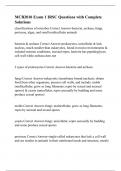
-
MCB2010 Exam 1 IRSC Questions with Complete Solutions
- Exam (elaborations) • 15 pages • 2024
-
- $15.99
- + learn more
classifications of microbes Correct Answer-bacteria, archaea, fungi, protozoa, algae, and small multicellular animals bacteria & archaea Correct Answer-prokaryotes, unicellular & lack nucleus, much smaller than eukaryotes, found in moist environments & isolated extreme conditions, asexual repro, bacteria has peptidoglycan cell wall while archaea does not 2 types of prokaryotes Correct Answer-bacteria and archaea fungi Correct Answer-eukaryotic (membrane bound nucleus), obtain food from ...
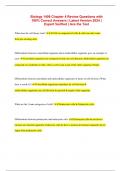
-
Biology 1406 Chapter 4 Review Questions with 100% Correct Answers | Latest Version 2024 | Expert Verified | Ace the Test
- Exam (elaborations) • 8 pages • 2024
- Available in package deal
-
- $8.49
- + learn more
What does the cell theory state? All life is composed of cells & cells can only come from pre-existing cells. Differentiate between a unicellular organism and a multicellular organism, give an example of each. Unicellular organisms are composed of only one cell; Bacteria; Multicellular oganisms are composed of a multitude of cells, where a cell is only a part of the entire organism; People. Differentiate between unicellular and multicellular organisms in terms of cell division. (What does ...
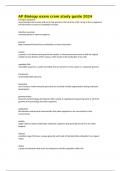
-
AP Biology exam cram study guide 2024
- Exam (elaborations) • 152 pages • 2024
-
- $15.59
- + learn more
AP Biology exam cram study guide 2024 emergent properties new properties that emerge with each step upward in the hierarchy of life, owing to the arrangement and interactions of parts as complexity increases inductive reasoning reasoning based on observed patterns polymer large compound formed from combinations of many monomers meiosis a process in cell division during which the number of chromosomes decreases to half the original number by two divisions of the nucleus, which...

-
Biology 198 Exam 6 Questions and Answers Already Passed
- Exam (elaborations) • 45 pages • 2024
- Available in package deal
-
- $11.99
- + learn more
Biology 198 Exam 6 Questions and Answers Already Passed _____ are formed as a result of mutualistic interactions between fungus and a photosynthetic microbe such as a green alga or a cyanobacterium lichens Lichens form because the mutualistic interactions exists from bother partners _____ from each other benefiting The fungus supplies the green alga or cyanobacterium with carbon_____, minerals, and ______. The fungus also protects its partner's photosynthetic mechanisms and provi...
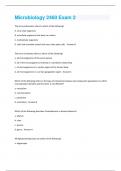
-
Microbiology 2460 Exam 2 Questions With 100% Correct!!
- Exam (elaborations) • 18 pages • 2024
- Available in package deal
-
- $7.99
- + learn more
The term prokaryotes refers to which of the following? A. very small organisms B. unicellular organisms that have no nucleus C. multicellular organisms D. cells that resemble animal cells more than plant cells. - Answer-B The term microbiota refers to which of the following? a. all microorganisms of the same species b. all of the microorganisms involved in a symbiotic relationship c. all microorganisms in a certain region of the human body d. all microorganisms in a certain geographic r...
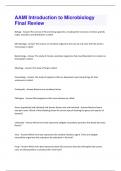
-
AAMI Introduction to Microbiology Final Review Questions With 100% Correct Solutions.
- Exam (elaborations) • 11 pages • 2024
- Available in package deal
-
- $7.99
- + learn more
Biology - Answer-The science of life and living organisms, including their structure, function, growth, origin, evolution, and distribution is called: Microbiology - Answer-The science of unicellular organisms that can be only seen with the aid of a microscope is called: Bacteriology - Answer-The study of minute unicellular organisms that resemble plants but contain no chlorophyll is called: Mycology - Answer-The study of fungi is called: Parasitology - Answer-The study of organisms that ...

-
GMU Bio Diversity Exam 1 Review with Complete Solutions
- Exam (elaborations) • 28 pages • 2024
-
- $9.99
- + learn more
GMU Bio Diversity Exam 1 Review with Complete Solutions Actinobacteria -Filamentous bacteria (resemble fungi) -Not all have high GC content -Streptomyces spp. are an important source of many antibiotics (tetracycline, chloramphenicol, streptomycin, neomycin) -Mycobacterium tuberculosis and M. leprae pathogenic Actinobacteria -Generally not spore-forming (Streptomyces an exception), "gram-positive" but some have an outer membrane and stain variably; some contain mycolic acid in the ...
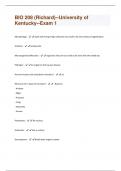
-
BIO 208 (Richard)--University of Kentucky--Exam 1 Questions and Answers 2024
- Exam (elaborations) • 14 pages • 2024
- Available in package deal
-
- $7.99
- + learn more
Microbiology - deals with living things ordinarily too small to be seen without magnification Acellular - lacking cells Microorganisms/Microbes - organisms that are too small to be seen with the naked eye Pathogen - An organism that causes disease Are non-human cells included in microbes? - no What are the 7 types of microbes? - - Bacteria - Archaea - Algae - Protozoa - Fungi - Helminths - Viruses Prokaryotic - No nucleus Eukaryotic - Has a nucleus Decomposers - Break down organic ...
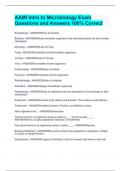
-
AAMI Intro to Microbiology Exam Questions and Answers 100% Correct
- Exam (elaborations) • 13 pages • 2024
- Available in package deal
-
- $11.99
- + learn more
AAMI Intro to Microbiology Exam Questions and Answers 100% Correct AAMI Intro to Microbiology Exam Questions and Answers 100% Correct AAMI Intro to Microbiology Exam Questions and Answers 100% Correct AAMI Intro to Microbiology Exam Questions and Answers 100% CorrectBacteriology - ANSWERStudy of bacteria Bacteria - ANSWERMinute unicellular organisms that resembles plants but dont contain chlorophyll. Mycology - ANSWERStudy of Fungi.

Do you wonder why so many students wear nice clothes, have money to spare and enjoy tons of free time? Well, they sell on Stuvia! Imagine your study notes being downloaded a dozen times for $15 each. Every. Single. Day. Discover all about earning on Stuvia


